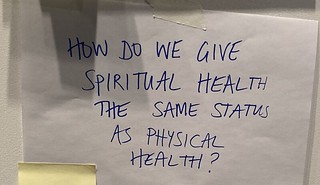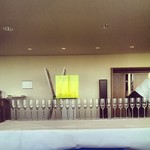We got a call just after 10:30am on Wednesday from ITN saying that they had a film crew in Guildford reporting on the overnight snow and wondering whether they could come and film at our Warm Hub.
In the late summer, you know when we had a change of monarch and several prime ministers and for all the reasons it was becoming clear that fuel prices were about to go up very quickly and probably stay there, we decided to open our doors every weekday morning during the winter (very loosely November to March) for anyone who might need warmth either physical or metaphorical. Lots of people were talking about it at the time and that got crystallised into the #WarmWelcome movement and Surrey County Council put some funding towards supporting “Warm Hubs”. We didn’t care much about the branding, though it was nice to have the funding. As it’s turned out, for many reasons, most of which we can only speculate about, few people came for help (here and in other hubs around the county) but those who have done have really appreciated it.
Anyway, that’s not today’s story, that’s just something you need to know because I’ve been naughty and not writing here as much as I should have. If I were the natural-born blogger that sometimes people say I am, you’d be sick of hearing about this by now.
So I said yes of course (just say yes!) but couldn’t guarantee whether anyone would still be there when the crew turned up. There were a few people in the foyer and we were doing our dementia-friendly Sunflower Café in the sanctuary. They did come quite soon afterwards (two women carrying all the kind of kit that you’d expect for proper grown-up TV, not like those social media amateurs you get these days!) and we chatted and gave them tea and then I did a little interview and the camera operator got some B-roll and then they also interviewed some of the people at the café about how they were dealing with the cold weather. Everyone was very polite, as Guildford people are, and answered the questions without revealing what’s really going on.
Because really, who wants to go on TV and say “oh it’s miserable, I’m having a terrible time, can’t afford to keep warm, can’t afford to eat, and my life-partner, who I’ve loved to bits for fifty years, has dementia and needs constant attention… but it’s great that I can come here and have a free cup of tea and some biscuits and maybe some advice on how to save energy.”
It was easier for me because a) I’m not in the same predicament; b) I have a job title to hide behind; c) I’ve always got lots to say when asked; d) we had a similar media request before Christmas and I prepped some talking points then.
All the same I did end up rambling a bit about how “isolation” means something different for rich people in Surrey versus poor people in inner cities, but the bit that made it to broadcast was me saying “It’s just been grey and it’s felt like the sun’s not gonna come back and that just has a massive effect on everybody’s mental health, both in terms of feeling a bit down but also just feeling tired.”
It has the slogan “Keep Calm And Play The Ukulele”
After another cup of tea and stocking up on custard creams, they left us to visit the gritting depot.
I was left feeling really sorry for them, dashing around town in the cold, trying to tell a story out of all of this, for an early evening TV audience who probably get up after the main news to put the kettle on. And what’s the story? It snowed and it was cold but people, being people, just got on with their days – those that can, had fun; those that have jobs to do, did their jobs. My suspicion/prejudice is that the demographic that watches ITV local news mostly couldn’t have fun in the snow and probably don’t have jobs.
This link might break soon, I don’t know how long they keep this sort of thing up for, but looking at the resulting 2m18s of film made me think of the mirror-image, the news items we get in the summer, the ones that go “oh blimey, isn’t it hot?!” and show a bunch of pink English people in the park and someone trying to deal with molten tarmac before cutting to a warning to be careful near water. At what point do we stop doing this? I mean, stop treating these weirder weather patterns as comic/tragic filler between the “real” news and the early evening soaps. No it’s not unheard of for us to have snow in early March, but what I said about it feeling that the sun isn’t coming back is unusual and it comes on the back of earlier winter months when it felt like it was never going to stop raining and then the summer last year when it felt like it was never going to rain again. That’s the description of climate change that feels closest to my direct experience.
It leaves me thinking about what media we *could* be making about what’s really going on, so I guess that’s why I seem to be blogging again.




![IMAG0868[6732]](https://perfectpath.files.wordpress.com/2020/02/imag08686732.jpg)



